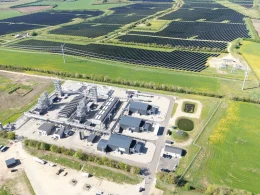US oil and biofuel industry groups have come together in an unusual alliance to urge the Trump administration to increase the volume of renewable fuels required to be blended into the national fuel mix from 2026 onwards.
The move is significant as the oil and biofuels industries have historically been at odds over the Renewable Fuel Standard (RFS) programme, a nearly two-decade-old law mandating refiners to blend billions of gallons of biofuels, such as corn-based ethanol, into conventional fuels like petrol or to purchase credits from those that do.
While the oil industry has traditionally viewed biofuels as competition to petroleum-based fuels, both sectors now share a common interest in resisting the rise of electric vehicles (EVs), which threaten the market for liquid fuels.
Last month, President Donald Trump revoked an executive order from his predecessor Joe Biden, which aimed to make half of all new vehicles sold by 2030 electric, part of efforts to cut greenhouse gas emissions. The oil and biofuel groups argue that liquid fuels remain vital to the US economy and consumers should retain the choice of how to power their vehicles.
“While our organisations have not always agreed on every detail, we have joined together in recognition of the critical role liquid fuels serve in the American economy, to advance liquid fuels, and ensure consumers have a choice of how they fuel their vehicles,” the groups wrote in a letter to Lee Zeldin, the newly appointed administrator of the Environmental Protection Agency (EPA).
The letter called for higher renewable fuel volume mandates, stating that strong and stable targets for conventional biofuels, biomass-based diesel, and advanced fuels would better reflect the growing availability of feedstocks and production capacity.
Among the signatories were the American Petroleum Institute (API), the Renewable Fuels Association (RFA), and Growth Energy, key industry players representing both oil and biofuel interests. However, the American Fuel and Petrochemical Manufacturers (AFPM), another influential oil trade group, did not sign the letter.
The coalition also urged the EPA to set multi-year standards for the RFS to provide greater market certainty for refiners and renewable fuel producers. Until 2023, renewable volume obligations (RVOs) were set annually, but under Biden’s administration, targets were extended through 2025. The upcoming years will require new considerations for 2026 blending volumes and beyond.
The EPA’s current biofuel blending mandates stand at, 20.94 billion gallons for 2023, 21.54 billion gallons for 2024, and 22.33 billion gallons for 2025.
With discussions on 2026 targets set to begin soon, the rare alignment between oil and biofuel groups signals a growing push to secure the long-term role of liquid fuels in the US energy mix, despite the increasing policy focus on electric mobility.





















